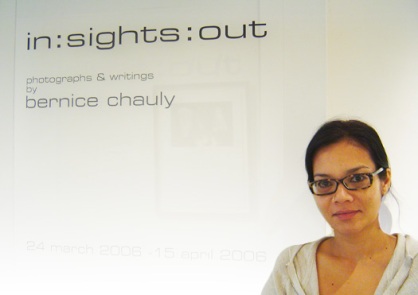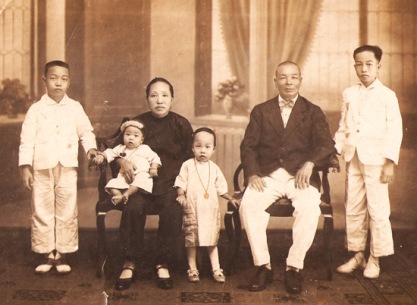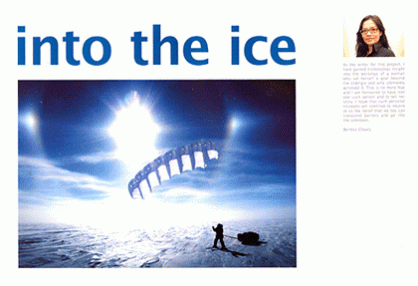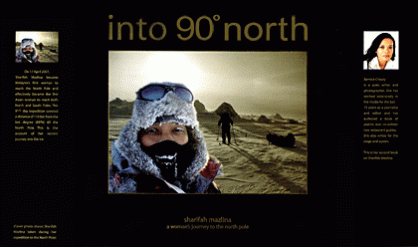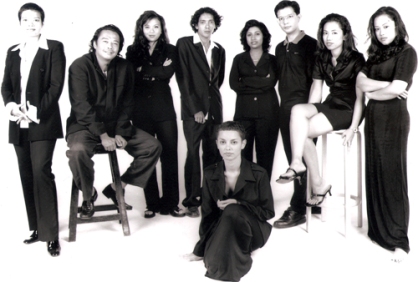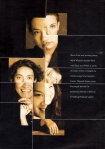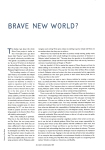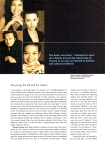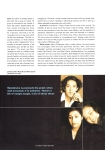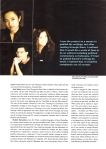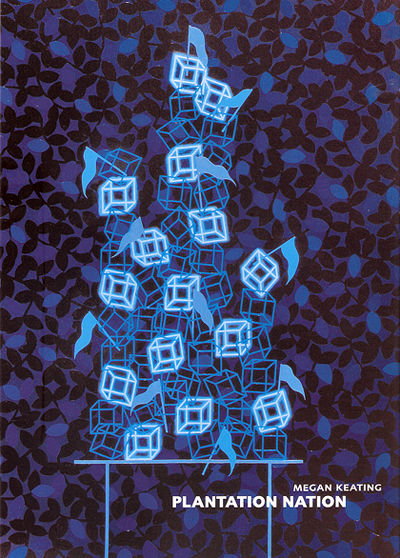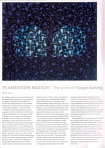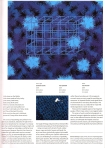Winternachten
August 11, 2010
Bernice Chauly 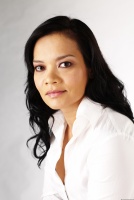 (Georgetown, Penang, Malaysia, 1968) is a Malaysian writer, poet, photographer and teacher. She graduated with a B.Ed in English Literature and TESL in 1990 from the University of Winnipeg, Canada. She has published two acclaimed collections of poetry, going there and coming back (1997), The Book of Sins (2007) and a collection of short stories, lost in KL (2007). Her poetry and prose is largely personal and she works in both English and Bahasa Malaysia. She has worked as a journalist, publisher, editor, travel/food writer and has also written for the stage and screen. She is passionate about telling stories and is concerned with issues of marginalization, human rights and identity. Her work with refugees, AIDS, sex workers, indigenous peoples and masters of folk traditions has been documented in award-winning works that span photography, monologues, plays and film. Her work has also appeared in many international and regional anthologies. She is currently finishing a memoir, part of her MA in English Literature/Creative Writing, called Growing Up with Ghosts on her Chinese-Punjabi ancestry; a diasporic, historical and factional account of her family history in five voices. A seasoned performer for the stage and screen, she is also a key organiser and founder of literary events in Kuala Lumpur.
(Georgetown, Penang, Malaysia, 1968) is a Malaysian writer, poet, photographer and teacher. She graduated with a B.Ed in English Literature and TESL in 1990 from the University of Winnipeg, Canada. She has published two acclaimed collections of poetry, going there and coming back (1997), The Book of Sins (2007) and a collection of short stories, lost in KL (2007). Her poetry and prose is largely personal and she works in both English and Bahasa Malaysia. She has worked as a journalist, publisher, editor, travel/food writer and has also written for the stage and screen. She is passionate about telling stories and is concerned with issues of marginalization, human rights and identity. Her work with refugees, AIDS, sex workers, indigenous peoples and masters of folk traditions has been documented in award-winning works that span photography, monologues, plays and film. Her work has also appeared in many international and regional anthologies. She is currently finishing a memoir, part of her MA in English Literature/Creative Writing, called Growing Up with Ghosts on her Chinese-Punjabi ancestry; a diasporic, historical and factional account of her family history in five voices. A seasoned performer for the stage and screen, she is also a key organiser and founder of literary events in Kuala Lumpur.
participant in
Antilles/Suriname 2010
Tori fu dya nanga abrawatra — Stories from here and overseas
Crusa Lama — Aruba
Krusa Laman — Kaminda rais a kue tera/A Sense of Belonging – Curaçao
Krusa Laman — Curaçao
Crossing the Seas — Sint Maarten
(post taken from: Winternachten: Bernice Chauly)
The quiet desperation of crumbling regimes, by Nathaniel Tan
March 29, 2010
Article below is taken from Malaysian Insider.
MARCH 29 — Bernice Chauly has a number of photos currently on display at the Annexe Gallery that I hope you’ll find time to have a look at (the rest are quite good as well).
In this series, she photographs a number of her close friends and her own children from above, lying on the ground in a Teoh Beng Hock-esque pose, as if they had fallen to their deaths.
She writes that her choice of subjects and “models” denote “a sense of overwhelming danger, a sense that this could happen to anyone, to our children and loved ones — that none of us is safe.”
The title of Chauly’s series is “Killing Time”, and as Henry David Thoreau writes in “Walden”: “As if you could kill time without injuring eternity.”
The sentence which directly follows that line is perhaps the one most often quoted from his book: “The mass of men lead lives of quiet desperation.”
I share Chauly’s concerns as to the safety and welfare of Malaysians, and I feel that the root of our insecurity is the quiet desperation of a select few.
I do not mean the same type of quiet desperation that Thoreau did, though I feel — like the rest of us — have had my share of such.
The desperation is nonetheless real and over-reaching, and it is quiet in an altogether more dangerous way. It is the desperation of a crumbling regime.
Malaysia’s authorities remind me of Star Trek’s Borg. Borg drones don’t look particularly bright, but your phaser rifle will usually work on one or two of them at the most. Thereafter, they adapt and learn how to resist your attacks.
Our government has had decades to learn what works and what doesn’t. Every 10 years, they come close to being toppled, and yet they somehow emerge in (more or less) one piece, having learnt valuable lessons. In a few ways, they continue to adapt and assimilate — just like the Borg. (In other ways, they appear set on recycling certain salacious scripts).
Assimilation is nowhere clearer than in BN’s adoption of 1 Malaysia and now, this New Economic Model (We started with the NEP, moved to Anwar’s Malaysian Economic Agenda, before reaching the NEM. Next? AEP? NEA? PEA-NUTS?) — both clearly pirated concepts inspired by the success and appeal of Pakatan’s Ketuanan Rakyat and multi-racial formula.
In and of itself, this type of competition is not wholly bad for the rakyat — after all, good ideas should be imitated. Sadly, the story doesn’t stop there.
Judging by the pattern that is now so insidiously forming before our eyes, stealing Pakatan’s ideas has not been enough.
The evidence suggests that there is a systemic, consistent effort to suppress any efforts to break BN’s hegemony on information and power.
When the regimes of Suharto and Marcos faced their dying days, their desperation manifested itself in state-sponsored violence. It appears the “masters” of Malaysia, however, have foregone similar full frontal attacks for orchestrated hit and runs.
Instead of banning books or persecuting authors, the police now harass and intimidate bookstores — businesses at the mercy of the authorities — effectively creating a backdoor ban on the books. Due to this pressure, I believe one can barely find copies of Where is Justice? 1FunnyMalaysia, or Politicians Say the Darndest Things Vol. 2 (on the shelves for over a year, mind), in a single Malaysian bookshop anymore, even though it is still 100 per cent legal to sell them.
There seems to be a pattern of leaving alone those who are resistant to pressure, while constantly finding alternative targets who are more susceptible to intimidation.
BN politicians no longer even need to attack their Pakatan counterparts, seeing as they now have a full stable of “independent” representatives to attack Pakatan and Anwar on their behalf (and yet until today, YB Zahrain has yet to answer allegations that he tried to get millions awarded to a RM 2 company).
This is not to say that more direct strategies have been totally abandoned. Pakatan speakers are still regularly prevented from giving ceramahs, the most recent dramatic example being in Kelab Sulaiman — where Anwar spoke at the Malay urban heart of the nation. YB’s Nurul Izzah and Tian Chua get called in for questioning months after a ceramah to have their statements taken – suggesting either a conspiracy or tortoise-like investigative speeds of the police.
The end goals of this low intensity war of attrition appear to be at least three-fold.
Firstly, to distract from the clear failures of the present administration.
Like some bad joke about Europeans, cars and sex, it appears as if the original goal for the current powerful was to be as firm as Mahathir and look as kind as Abdullah. Instead, they are about as firm as Abdullah and as kind as Mahathir.
Despite rhetoric, economic reforms are going nowhere and no change is being felt by the man in the street. MCA is in turmoil, while MIC has totally disappeared from both the news and national relevance.
We must refuse to be quiet, however, when political gimmicks start to risk lives. Surely recent allegations that 1 Malaysia Clinics are staffed by medical assistants (instead of qualified doctors) providing wrong diagnoses and making prescriptions that they are not legally allowed to prescribe, thus putting lives unnecessarily in danger, deserve our fullest attention.
Secondly, to prepare for general elections before too long. With the 1 Malaysia, the NEM, Progam Reforma… sorry, Transformasi Kerajaan, and the 10th Malaysia Plan, we are looking at a major (but ultimately empty?) public relations onslaught. I imagine polls are high on BN’s mind.
Lastly, to make life unbearably inconvenient for those working at change, without doing anything “serious” enough that they think people will care.
After all, who can expect Joe Malaysian to worry if a book is taken off the shelves, or a few YB’s get called in for questioning. Here though, who can not think of Neimoller’s poem, “First They Came” or the Reverend Martin Lughter King’s “Injustice anywhere, is a threat to justice everywhere.”
Bernice Chauly captured the spirit of these two gentlemen perfectly, and I hope her work — and everyone else’s — helps us all realise that all these little things happening around us add up; that the heart can be choked by many little arteries, as much as it can be choked by a single big one.
As we resist, we must cultivate our optimism from the fact that the effort put into suppressing the free flow of information and wrongful intimidation of alternative voices indicate more than anything else a crumbling, bankrupt regime. We must be determined that they shall never, ever injure the just, prosperous eternity Malaysians deserve.
* The views expressed here are the personal opinion of the columnist.
Nathaniel Tan believes this world is full of people, he was born to love them all. He blogs at www.jelas.info
Time to tell the true tales, by Hariati Azizan and Sumisha Naidu
February 1, 2010

Chauly: ‘We need to start writing and documenting these stories because they are part of our emotional landscape’.
Ladies, do you have a story to tell? If you do, share it with the Herstory Films Project, which aims to encourage Malaysian women to relate their stories and learn from each other’s life experiences.
FACED with no other prospects on the estate, a young girl was forced to marry her uncle. Another was beaten blue-black by her parents, all for accepting an ice-cream cone from a Chinese boy.
These “first love” stories were just bursting to come out when we met a group of women from the estate community in Banting, Selangor, recently, says indie filmmaker Mien Ly.
But it was only when they became comfortable that they were able to divulge their lost dreams and unfulfilled desires, she says.
Mien, along with a group of young women filmmakers and artists, is hoping to tell the untold stories of Malaysian women through their HerStory Films Project. To do this, they have to collect stories on love, desire and sexuality from women from all walks of life in Malaysia and then translate them into short films.
Leading female artists and activists including feminist Angela M. Kuga Thas, thespian Mislina Mustaffa, writer/ photographer Bernice Chauly, and local producer Lina Tan are mentoring the project.
“Many women think their stories are not worth telling. What they don’t realise is that by getting their stories out, they will get a better understanding of themselves as well as each other. Women everywhere face the same issues and struggles,” Mien says.
“Stories are always important, especially in a country like Malaysia which is diverse and mostly patriarchal,” Chauly chips in.
“Many women in Malaysia are marginalised. They are not encouraged, or sometimes not even allowed, to talk about themselves.”
The HerStory project was initiated by Mien who was inspired by the stories she heard from women at a Knowledge and Rights with Young People through Safer Spaces (KRYSS) workshop on gender and sexuality last year.
Through her work as co-founder of Filmmakers Anonymous, a group that organises bi-monthly screenings of local short films, Mien realised that there is a real lack of women storytellers in Malaysia.
“We want to encourage more women to share their stories and to learn how to tell them as well,” she says.
“We don’t have enough stories of women politicians, leaders and fighters, what more ordinary women. We need to start writing and documenting these stories because they are part of our emotional landscape,” says Chauly, telling the story of her grandmother who married a stranger a week before leaving China for a strange land (Malaya) as an interesting example.
Chauly feels that many women are too scared of a backlash to write about themselves.
“When you decide to tell a story, whether it is personal or not, you take a risk as you put yourself on the line. Women who write about themselves are often accused of airing their dirty linen in public. So an important thing to remember is that you cannot please everyone,” she advises.
Kuga Thas agrees, saying: “Women seem to need permission to tell their story. Even women who are educated need validation that their story is important enough to be told. We hope that with the project more women will be brave enough to come out of their shell.”
Herstory wants to reach out to all women including sex workers, drug users, and those who are HIV positive, she says, adding that they want to focus on them as people, as Malaysians, as “someone whom you would pass by on the street”.
Mislina Mustaffa, another mentor, stresses that they are looking for honesty and originality in the stories.
“But the more sexual their stories are the better,” she says with a laugh.
Jokes aside, she says they hope to make women more confident about expressing themselves and gain the courage to be honest.
“For the project, I want women to just talk about their sexual desires. Nothing is wrong with saying what you really want.
“Sex is still a taboo and women don’t want to talk about it. What I’ve noticed is that many women have issues about their bodies, no matter who they are. Their insecurities about their bodies affect their whole lives,” she says.
The project hopes to raise funds for production too, and they are also looking for possible partners for the portable screening nationwide, according to Mien.
HerStory is looking for true stories from women of any age, background or location in Malaysia. They must be submitted by Feb 10, 2010. A total of 20 stories will be short-listed. The selected storytellers will undergo a workshop with the arts and film mentors to turn their stories into scripts. A minimum of five will be made into short films.
Once completed, the films will be screened through a portable film festival that will travel throughout the country. The film screenings will be used as an opportunity to talk to women about their desires and sexuality while encouraging them to tell their own stories.
“Films are a good way to bring in all the issues that are typical in Malaysia, such as race, religion and even class,” says Kuga Thas when asked why they had chosen films as the final product.
Stories can be written or audio recorded in either Bahasa Malaysia or English. To find out more about HerStory Films Project or how you can contribute, visit http://herstoryfilmsproject.blogspot.com/ or contact Mien at 012-696 9455 or Vizla at 017-6318326.
post taken from The Star Online
Different, but Same
September 11, 2009
This is a new series of work from the group show “Different, but Same”.

Killing Time 1
 Killing Time 2
Killing Time 2
 Killing Time 3
Killing Time 3
A Photography ExhibitionFeaturing Alex Moh, Azril K Ismail, Azrul K Abdullah, Bernice Chauly, Ceacer Chong, Eiffel Chong, Erna Dyanty, Lim Hock Seng, Pang Khee Teik, Tan Chee Hon and Yee I-Lann
at Wei-Ling Gallery
N0 8 Jalan Scott, Brickfields,
Kuala Lumpur
Phone: 603226011067
Email: weiling@weiling-gallery.com
Exhibition runs from Tue 1 Sep – Mon 14 Sep, 2009.
Opening Hours: Mon-Fri 12pm-7pm
Sat:10am-5pm
Sun : By Appointment
Preview: Tue 1 Sep, 12pm-7pm
On 17 April 2007, Sharifah Mazlina became Malaysia’s first woman to reach the North Pole and effectively became the first Asian woman to reach both North and South Poles. This 9 1/2 day expedition covered a distance of 110km from the last degree (89 degrees N) till the North Pole. This is her account of her second journey into the ice. Written by Bernice Chauly.
